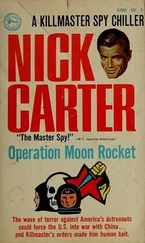I wondered what that meant. “Like radar?”
There was another pause. “Yes. Vernon Dunham, your time is short.”
“ Tempus fugit, vita brevis .” Not exactly right, but close enough. “Who are you?”
“I am the engine of flight. Time is short, for you and for me. There will be grave consequences if I am discovered here by they who search for me.” The rolling radio preacher hadn’t left its voice completely, I was glad to hear.
I wanted to pursue the technical issues, but the aircraft sounded worried. “Who is searching? As far as I know, both the CID and the Nazis are on to you.”
“Either would be trouble. I worry more about the Germans.”
“Why?”
“They are up to no good, son.” The aircraft paused for a moment. “I will most likely be abused by them to the hurt of many others.”
“And the CID?”
“They will just have me destroyed in the name of research. I understand you call it national security.”
“Look,” I said, “I believe your fears. Things have been strange around here lately, and it’s all about you. I don’t think I’m crazy, but I might as well be, talking to an airplane that some lunatic Germans dug up out of the Arctic ice. Who or what are you?”
There was a lengthy pause. I began to wonder if the voice had withdrawn from our conversation. Finally, it answered. “I am a mistake.”
This was not what I was expecting to hear. “A mistake?”
“I am not supposed to be here.”
“Here in Kansas?”
“Here on your planet. On Earth.”
Whoops. Now we were in the territory of Floyd’s pulp magazines and Jules Verne novels. It made sense — explained away the burying in the ice, the manufacturing and engineering issues, the fundamentally inhuman nature of the thing — but was still unbelievable.
Literally.
I was talking to a rocket ship from outer space. “You are a space alien,” I said.
“While I am alien, I am not biological,” said the voice, now prim. “I am a machine.”
“A computing machine,” I said, awed. “A robot.” I had seen some references in technical journals to new theories about information machines, monstrous mechanical calculators that could work up artillery firing tables or rocket trajectories in mere days. There were already hints leaking out that the British had done important work on them during the war. “You are a computing machine, aren’t you? Built inside of a rocket. Not an aircraft.”
“Among other things, yes.”
“I knew you were too good to be true.” Something occurred to me. “You’re a machine, but you’re smart. I saw your wings spread wide in the barn there. Why don’t you just leave? Can’t you fly?”
“I need help, son. I need supplies, approximately four hundred liters of hydrocarbon lubricants to replenish stocks lost when my systems ruptured during my original crash.”
My aircraft — no, the computational rocket — needed hydrocarbons. Oil. In Augusta, Kansas, home to one of the largest oil refineries in the Midwest. It made me wonder what Floyd might have known all along that he hadn’t told me, how carefully this had been planned. “I might be able to help you.”
“Help me soon,” said the alien machine. “Please.”
“Vernon!” shouted Floyd from the house. “Did you fall in? We need you in here.”
“Coming!” I yelled. The computational rocket didn’t seem to have anything more to say right then, so I abandoned my business in the outhouse.
“Next time use the darned chamber pot,” Floyd called from the kitchen as I stepped on to the porch.
Floyd, Mr. Bellamy and Mr. Neville were still sitting around the dining table. After visiting the outhouse and finally learning some answers about the computational rocket, however tantalizing they might be, I was starting to feel better. The cup of coffee Floyd handed me helped even more.
“Vinnie,” said Mr. Bellamy. “Floyd has asked Mama and me to stay out of the barn. So far, I’ve respected his wishes. But you getting shot at and everything — that puts all of us in a serious position. I need to know what you have in there — whether it’s money, or something you stole. It don’t matter, but you got to tell me.”
I looked at Floyd. Mr. Bellamy’s sudden transition to the bloom of tough-minded health still concerned me. “What have you told him?”
“Nothing specific,” said Floyd. “So you go ahead and tell it your way.”
I rubbed my forehead. The computational rocket had asked me to keep its existence a secret, but it was sitting forty yards away from here in a barn with door blown off. There was no secret to keep, at least not with the men at this table. If I lied, it would go badly for me. I had to tell them everything they already knew, and balance the rest.
“Mr. Bellamy, it’s like this. Floyd brought something home from Europe, a special kind of airplane the Germans had been working on.” That wasn’t actually untrue, although it was far enough from the complete truth as to be a lie. “I don’t know that he actually stole it, but it’s not rightfully his. Should have gone to the government as soon as it was found.” I shot Floyd a meaningful glance, but he was busy staring at the ceiling. “Anyway, near as I can tell there’s Nazi agents here in Butler County looking for that special airplane, and there’s US Army investigators looking for the Nazis.”
“And just who did you run over in the Cadillac?” asked Mr. Neville.
“At the time, I thought he was a Nazi, but now I think he might really have been from the Army.”
“You couldn’t tell the difference?” asked Mr. Bellamy.
“Something Sheriff Hauptmann said confused me.” I wasn’t going to call Hauptmann a liar in front of these men, but I just couldn’t quote him.
Mr. Neville leaned his elbows on the table at set his chin in his hands. I had the sense of being appraised again, as if he were deciding whether to raise or lower my value. “Why the hell were you talking to the Sheriff?”
I edited the story for their consumption. Floyd and Mr. Bellamy already knew some of it anyway. I kept it straight, though, under Mr. Neville’s steady gaze. “My dad got beat nearly to death and dumped in the trunk of my car. One thing led to another, and I wound up on the griddle between Sheriff Hauptmann and Doc Milliken. It was Hauptmann that told me there was fake Army captain around these parts, a Nazi pretending to be a CID man who’d actually been murdered in Kansas City.”
“So…” said Mr. Bellamy. “Let me see if I understand you correctly. This thing you can’t discuss is in my barn, which Floyd has kept me out of for days. There are Nazis and Army officers looking for it, looking for you, and probably looking for Floyd. And you tried to kill one of them with Doc Milliken’s Cadillac. Did I miss anything?”
“My dad is missing,” I said miserably. Maybe this gang had the contacts to find him. “And I’ve been associated with an awful lot of property damage lately.”
“Son,” observed Mr. Neville. “You are in big trouble.”
“Hey, Floyd’s the one who stole it!”
Floyd smiled again, the full force of his charm like a glare. Everything was a joke to my buddy. “But you’re the one they know about.”
I toyed with the computational rocket’s radio handset in the pocket of my borrowed robe. Mr. Bellamy and Mr. Neville were in the kitchen, talking in whispers. Floyd hadn’t said anything since they left. He just sat there and smiled at me, like everything was going his way and in just a minute he’d get up and make the winning pass.
After a while I began to see he was nervous underneath the bluff and bluster. But Floyd had never been one to show weak in front of his old man.
Читать дальше












